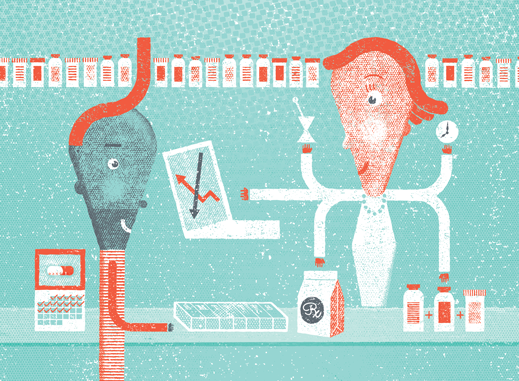Jennifer Hawkes answers some commonly asked questions about HIV treatment.
Many of us think of pharmacists as people who dispense drugs, but they do much more than that: They can offer advice on how to deal with side effects and avoid drug interactions. They can work with you to figure out drug coverage. And they are often easier to get a hold of than specialists. We decided to tap into the HIV expertise of B.C. pharmacist Jennifer Hawkes.
Do you have any good treatment adherence tips?
Keep your eye on the endgame! It can be a powerful motivator. Remember that taking your HIV medication every day is an important step that you can take to improve your health or stay healthy. And if you maintain an undetectable viral load, you can prevent HIV transmission.
Research shows that starting antiretroviral therapy early and taking it without treatment holidays or breaks leads to the best long-term health outcomes.
I like to have people play an active part in their own treatment adherence plans. This puts you in the driver’s seat. When you do something because you should, it can end up feeling like a chore. Plus, you know yourself and what works for you better than anyone else does.
Your Plan for Successful Adherence
Here are some things to consider when thinking about your adherence plan:
Timing is everything.
- Think about your daily routine. When are you most likely to remember to take your medication—when you wake up in the morning or go to bed at night? Lunch or suppertime can be more difficult to remember but may be necessary if your meds have to be taken with food and you sometimes skip breakfast.
- If you take other medications and supplements as well, for the sake of convenience take your HIV meds at the same time (unless two of the drugs can interact).
Use blister packs or a dosette box.
- Ask your pharmacy to blister-pack your meds. This typically free service is a convenient way to tell if you have taken your pills each day. You can cut a strip for each day so you have smaller pieces to take with you.
- If you’re not a fan of blister packs, consider buying an inexpensive dosette box to fill yourself. This way, you won’t have to wonder if you’ve missed a dose or worry that you’ve doubled your dose. When it comes to lifelong medications, the days can blend together.
Set up reminders.
- What or who can remind you to take your meds? Maybe it’s a visual reminder, such as where you put your medications—in plain view or near a bracelet or watch you put on every day. Maybe it’s a note in your calendar or an electronic reminder, such as an alarm on your phone, a text or an app. Or maybe it’s your partner, a friend or family member.
Anticipate possible obstacles.
- Identify and discuss any negative feelings, doubts or concerns you may have about taking your HIV medications. You should always feel like this treatment is the best choice for you. It is common to feel shame or internalize stigma around having HIV—many people do. Is there a supportive person you can talk with openly about it? Is there a group you can join at your local HIV organization? Once you feel more acceptance around living with HIV (getting to this place can be a process), this can allow you to shift your outlook to one of “I am doing a great job controlling my HIV.”
- If you are struggling with other health issues or social concerns—such as unstable housing, food insecurity, addictions or mental health challenges—seek support. These can all affect your ability to take your meds in the long term. It is often helpful to have a team of healthcare providers supporting you. If you are actively using street drugs, HIV meds will still work as long as you take them every day!
Prepare for the unexpected.
- Always have more meds on hand than you need. If you’re travelling, take extra. If you move around a lot, consider keeping a stash of a few days to a week’s worth in the places you frequent.
- Know where you can get more medications if you lose them, go on a trip or end up in the hospital.
- Try not to get to that last pill before you call for a refill because some pharmacies do not serve many people who take HIV meds.
Be your own cheerleader.
- How will you reward yourself for great adherence?
- What motivates you to take your medications? Is it a loved one, your pet, your care team, your desire to be healthy and live long? Make sure to remember these things on the tough days.
- Forgive yourself if you occasionally miss a dose every few months. You’re only human!
What kinds of side effects will my drugs have?
Although most prescription drugs come with a long list of possible side effects, it’s worth remembering that some people don’t notice any side effects from their HIV meds!
If you do experience side effects, they will likely subside or go away over time (in a matter of weeks to a month) and can be managed. For example:
- Nausea can often be improved by taking the medication at a different time, taking it with food, ensuring you’re well hydrated, avoiding constipation or taking an anti-emetic medication to prevent nausea before you take your meds.
- Decreased appetite can often be dealt with by eating small frequent meals or sometimes by taking a medication to stimulate the appetite.
- Diarrhea can be treated with anti-diarrheal medications.
If your side effects persist, you and your doctor might want to consider a new drug regimen.
Do I need to worry about drug interactions?
Before you start or stop any medications, check with a doctor, nurse and/or pharmacist who has experience with HIV medications. Let them know about everything you’re taking, including over-the-counter products (such as pain relievers, acid reducers and nasal sprays), vitamins, supplements and street/recreational drugs.
You can look up information about individual HIV and hepatitis C drugs and check drug interactions at app.hivclinic.ca.
Is newer better?
A newer medication is not necessarily more potent or easier to take. Any guideline-recommended combination of HIV meds that you do not have resistance to and you feel well on can be a good choice.
For people who take some of the old drugs, such as didanosine (ddI), lopinavir-ritonavir (Kaletra) and stavudine (d4T), doctors typically recommend switching to a newer medication that is less toxic, has fewer long-term side effects and works better.
If you have bothersome or significant side effects or significant drug interactions, it is probably a good time to switch medications. If you feel worse after switching, the good news is you can switch back or switch again to another combination.
My HIV treatment is working well—I’m virally suppressed—but I’m thinking of switching my regimen to take fewer pills a day. Should I stick with my current treatment or switch to a simpler one?
Taking fewer pills is certainly more convenient, especially with several single-tablet fixed-dose combination pills available. But it’s worth noting that if you also take other medications (for example, for cardiovascular disease or kidney disease), when you switch regimens you might need to adjust the dose of those other drugs.
Let the doctor who oversees your HIV care, as well as your pharmacist and any other doctors, know about all the drugs you take (prescription, over the counter, street/recreational drugs and herbal supplements), so they can adjust your prescriptions accordingly.
If it puts your mind at ease to stick with what you know, especially if your current treatment is working well for you, there is no need to switch.
Another thing to consider: If you have problems swallowing pills, know that a single-tablet regimen will be a larger pill.
Will my pills stop working one day?
Ever since triple-drug combination therapy was discovered in the mid-1990s, people living with HIV develop drug resistance far less frequently. Theoretically, if you are adherent to your treatment regimen, you could be on the same medications for the rest of your life and they could continue working for you. If you are not sure whether you can take your pill(s) consistently every day, let your doctor, nurse and/or pharmacist know, as some drug combinations are more forgiving than others.
If I have HIV and hepatitis C, should I get my hepatitis C treated?
Yes. If you have HIV, your hepatitis C might progress more rapidly. People who are co-infected with HIV and hep C are one of the “priority groups” to receive the new well-tolerated and highly effective hep C treatments.
If you have good adherence to your HIV medications, you will likely have good adherence to hep C medications too—this is the most important part to having the treatment work.
To reduce or eliminate the chances of HIV and hep C drugs interacting, doctors sometimes switch people’s HIV treatment to a newer combination, such as one containing integrase inhibitors.
How will I know if my HIV treatment is working?
You and the doctor who oversees your HIV care will work together to ensure that your treatment is working. There are two things that will be monitored regularly with simple blood tests: your HIV viral load (lower is better) and your CD4 count (higher is better). The results of these tests will tell you and your doctor if your medications are working. Ideally, your viral load will become undetectable and your CD4 count will rise.

What else can I do besides take my meds and monitor my bloodwork?
For your physical self: If you are a smoker, consider quitting or cutting back. There are more smoking-related deaths among HIV-positive people than HIV-related deaths. If you’re a substance user, consider cutting back. A healthy diet and adequate sleep and exercise are also important. Keep your vaccinations up to date, including the yearly flu vaccine.
For your mind, spirit and emotional self: Don’t forget about these parts of your whole self!

